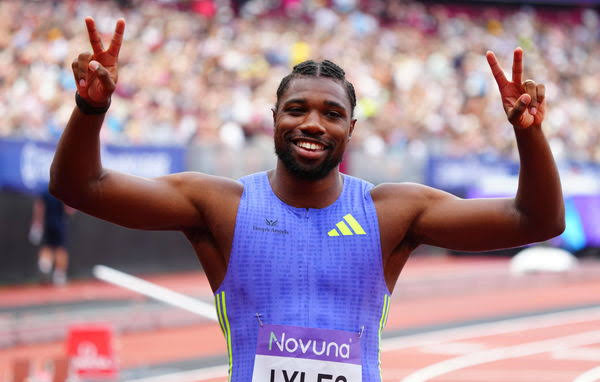
Noah Lyles, the reigning world champion and sprinting superstar, offered an honest and insightful breakdown of his 10.00-second performance in the 100m at the London Diamond League. While the time was far from his personal best and not what fans might expect from one of the sport’s top names, Lyles used the opportunity to reflect, educate, and look ahead with confidence.
Running in a stacked field that included Jamaican standout Oblique Seville, who ultimately claimed victory, Lyles finished outside the top three. However, the time itself — exactly 10.00 seconds — was his fastest of the season to that point. More importantly, it served as a crucial checkpoint in his preparations for the upcoming World Championships in Tokyo.
Speaking after the race, Lyles broke down each phase of his sprint with the clarity of a seasoned technician. “My start was decent — better than some of my previous races,” he said, “but I didn’t quite get the transition right.” He noted that while his reaction time was sharp, the drive phase lacked the fluid power he usually generates, which cost him valuable hundredths of a second in the middle portion of the race.
Lyles also emphasized the windy conditions and chill in the London air as minor factors, but he refused to lean on them as excuses. “Everyone ran in the same conditions,” he stated. “The key for me is execution, and I wasn’t as efficient as I needed to be.”
What stood out in Lyles’s post-race breakdown was his focus on technical refinement rather than frustration. Instead of bemoaning the time, he explained how his race was part of a broader strategy. “I’m not peaking for London — I’m peaking for the World Championships,” he reminded reporters. “This is all part of the process.”
His comments reflect a maturing approach to competition. Once known primarily for his exuberance and bravado, Lyles has grown into a more thoughtful and process-driven athlete. His recent form suggests he’s building steadily, even if the clock doesn’t yet show it.
Analysts agree that Lyles’s 10.00 wasn’t cause for concern. In fact, it signals consistency — he’s now run several races within a tight time range, showing that his base speed is solid. What remains is fine-tuning: getting that perfect start, finding the sweet spot in his transition, and maintaining top-end velocity to the finish.
Beyond the technical aspects, Lyles spoke candidly about the mental side of racing. “Every time I get on the track, I’m learning something,” he said. “I’ve been through seasons where I peaked too early. I’ve learned that discipline in timing your peak is just as important as raw speed.”
As the countdown to Tokyo intensifies, Lyles’s performance in London — and his willingness to dissect it publicly — underscores his commitment to excellence. The 10.00 was not a final statement, but a stepping stone. And if his history is any guide, it’s only a matter of time before Lyles lights up the track once again.
Be the first to comment